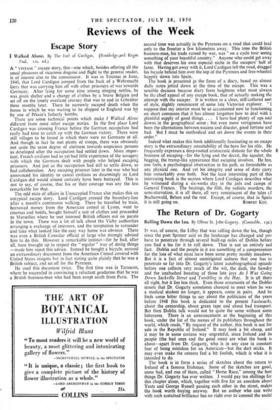Reviews of the Week
Escape Story
I Walked Alone. By The Earl of Cardigan. (Routledgelfind Kegan
Paul. i as. 6d.)
A " VINTAGE " escape story, this—one which, besides offering all the usual pleasures of vicarious disguise and flight to the general reader, is of interest also to the connoisseur. It was in Tournai in June, 1940, that Lord Cardigan jumped from the back of a Wehrmacht lorry that was carrying him off with other prisoners of war towards Germany. After lying for some time among stinging nettles, he was given shelter and a change of clothes by a brave Belgian and set off on the lonely overland jdurney that was to end in Gibraltar three months later. There he narrowly escaped death when the house in which he was waiting to be shipped to England was hit by one of Petain's fatherly bombs. There are some technical points which make 1 Walked Alone different from most other escape stories. In the first place Lord Cardigan was crossing France before the German occupation had really had time to catch up with the German victory. There were still villages to be found in which there were no Germans at all. And though in fact he met plenty of troops, there was obviously not quite the same degree of alertness towards suspicious persons as developed after the occupation had settled down. More impor- tant, French civilians had as yet had little experience of the savagery with which the Germans dealt with people who helped escaping prisoners. And just as the occupation had still to settle down, so had collaboration. Any escaping prisoner later in the war who had announced his identity to casual civilians as disarmingly as Lord Cardigan did would almost certainly have been betrayed. This is not to say, of course, that his or their courage was any the less remarkable for that.
The odd state of affairs in Unoccupied France also makes this an untypical escape story. Lord Cardigan crossed the boundary-line after a month's continuous walking. There he travelled by train, borrowed money from the American consul at Lyons, went to cinemas and hotels, bought himself a suit of clothes and proceeded to Marseilles where he met interned British officers out on parole in the town. There was a lot of talk about the Vichy authorities arranging a exchange of internees, and the temptation to surrender and take what looked like the easy way home was obvious. There was even a British Consular official at large who strongly advised him to do this. However a remarkable instinct—for he had, after all, been brought up to respect the " regular " way of doing things —made him reject this advice. Instead he bought a bicycle, secured an extraordinary document from the American Consul covered with United States insignia but in fact stating quite plainly that he was a British subject, and set off for the Pyrenees.
He used this document twice. The first time was in Tarascon, where he succeeded in convincing a reluctant gendarme that he was a British business-man who had been swept south from Paris. The second time was actually in the Pyrenees on a road that could lead only to the frontier a few kilometres away. This time the British business-man, his trade ruined by war, was " on a cycle tour seeing something of your beautiful country." Anyone who could get away with that deserves his own especial niche in the escapers' hall of fame. Having got away with it, Lord Cardigan left the road, dragged his bicycle behind him over the top of the Pyrenees and free-wheeled happily down into Spain.
The book is presented in the form of a diary, based on almost daily notes jotted down at the time of the escape. This was a sensible decision because diary form heightens what must always be th.z. chief appeal of any escape book, that of actually making the attempt with the escaper. It is written in a clear, stiff-collared sort of style, slightly reminiscent of some late Victorian explorer. " I suppose that my interior must be so accustomed now to functioning on short commons that it has almost forgotten how to deal with a plentiful supply of good things. . . . I have had plenty of ups and downs in the geographical sense ; but even more vertiginous have been the alternations between success and disaster, good fortune and bad. But I must be methodical and set down the events in their order."
Indeed what makes this book additionally fascinating as an escape story is the extraordinary unsuitability of the hero for his role. He frequently expresses a deep-rooted aristocratic distaste for the whole II business of escaping—for the lying and the deceit, the squalor, the begging, the tramp-like appearance that escaping involves. He has, one feels, a psychological obstruction in his path, as formidable as any physical one. And yet his integrity and sense of duty carry him remarkably over both. Not the least interesting part of this interesting book is the section where Lord Cardigan describes what he witnessed during a six-weeks stay in the jails and camps of General Franco. The beatings, the filth, the sadistic murders, the semi-starvation, it is all there, all very reminiscent of the tales cf Buchenwald, Belsen and the rest. Except, of course, that in Spain


































 Previous page
Previous page